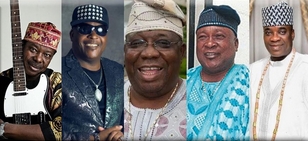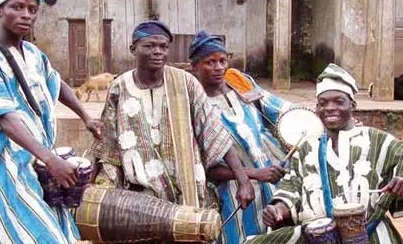
support@yorubalibrary.com
+2348073529208, 07038599574

Yoruba music is an integral part of the rich cultural heritage of the Yoruba people of Nigeria. Among the various genres that have emerged, Juju and Fuji stand out for their unique sounds, historical significance, performance and enduring popularity.
Origins and Development of Juju Music
Early Beginnings
Juju music originated in the early 20th century, evolving from traditional Yoruba musical forms. It blends indigenous Yoruba rhythms with elements of Western music, creating a distinctive sound.
• Pioneers: The genre was popularized by musicians like Tunde King in the 1920s and 1930s. They incorporated traditional instruments such as the talking drum, shekere, and agogo with guitars and other Western instruments.
• Evolution: Over the decades, Juju music evolved, incorporating new styles and instruments. The 1950s and 1960s saw the rise of iconic musicians like I.K. Dairo, who introduced the accordion, further enriching the genre.
Characteristics of Juju Music
Juju music is known for its complex rhythms, harmonious melodies, and lyrical content that often reflects Yoruba proverbs, folklore, and social commentary.
• Instrumentation: Juju music features a mix of traditional and Western instruments, including guitars, drums, keyboards, and various percussion instruments.
• Themes: The lyrics of Juju songs typically address themes of love, praise, social issues, and spirituality, often delivered in a call-and-response style.
Fuji Music: A Blend of Traditional and Modern
Origins and Influences
Fuji music emerged in the late 20th century, combining elements of traditional Yoruba music with Islamic and Western influences. It was developed from Were music, which was traditionally performed to wake Muslims during Ramadan.
• Pioneers: Alhaji Sikiru Ayinde Barrister is widely credited as the pioneer of Fuji music. He transformed Were music by incorporating a broader range of instruments and themes, creating a new genre that resonated with a wider audience.
• Evolution: Fuji music continued to evolve, with artists like Kollington Ayinla adding his unique styles and expanding the genre's reach.
Characteristics of Fuji Music
Fuji music is characterized by its energetic rhythms, dynamic percussion, and powerful vocal delivery. It often features a large ensemble of musicians and a wide array of instruments.
• Instrumentation: Key instruments in Fuji music include drums (such as the talking drum and bata), keyboards, saxophones, and electric guitars. The music is heavily percussive, with intricate drum patterns.
• Themes: Fuji lyrics often focus on everyday life, social issues, religious themes, and celebrations. The music is known for its lively, upbeat tempo and its ability to engage audiences.
Cultural Significance and Impact
Social and Cultural Influence
Both Juju and Fuji music play significant roles in Yoruba culture, serving as vehicles for social commentary, cultural expression, and entertainment.
• Community and Identity: These genres are central to Yoruba social events and celebrations, including weddings, festivals, and religious gatherings. They help preserve and transmit Yoruba culture and traditions.
• Social Commentary: Many Juju and Fuji songs address contemporary social issues, offering insights and reflections on societal changes, challenges, and values.
Global Reach
Yoruba music, particularly Juju and Fuji, has gained international recognition, influencing global music trends and earning accolades worldwide.
• International Appeal: Artists like King Sunny Ade (Juju) and Wasiu Ayinde Marshall (Fuji) have toured internationally, bringing Yoruba music to a global audience and collaborating with artists from various genres.
• Cultural Exchange: The global reach of Yoruba music fosters cultural exchange, allowing for a broader appreciation of Yoruba heritage and its contributions to world music.
Conclusion
Yoruba music, exemplified by the Juju and Fuji genres, is a testament to the rich cultural heritage and creative spirit of the Yoruba people. These genres continue to evolve, adapt, and influence, reflecting the dynamic and enduring nature of Yoruba music.

The unique styles of Yoruba Bata and Dundun dances…

The emergence of new age social media and impact i…